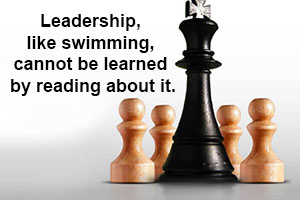 Guest blog by Robin Cochran, VP of Operations, Executive Forum
Guest blog by Robin Cochran, VP of Operations, Executive Forum
Last Friday I had a meeting with someone who knew nothing about Executive Forum. As I was explaining why our leadership programs are primarily face-to-face, he broke in and said, “It’s like swimming. You can’t learn to swim on the Internet either.” There’s a lot to learn about swimming, but you really can’t swim unless you get in the water.
He explained how his father had taught him to swim by taking him to the river near their home in India and pushing him in. He had to learn to swim. It took time and he got much better at it. He went on to explain that he had also wanted his children to learn to swim, so he spent time teaching them how to swim and also enrolled them in lessons at their local pool. He gave them the experience (swimming in the pool) along with lessons (the structure and meaning). He then added that his children are much better swimmers than him now, with significantly fewer years of experience.
Leadership is like swimming. New leaders are often thrown in and they either sink or swim. As they experience leadership, they often get better at it, but it takes time and a lot of trial and error.
As Forbes contributor Aaron Levy states, “If they don’t have the tools and skills, there’s a simple solution. Invest in helping them develop the skills. Start small and focused. The four most important skills any leader can develop is their ability to listen with intention and attention, ask powerful questions, communicate directly and hold critical conversations.”
Developing leaders can have a significant impact on an organization’s bottom line. Giving individuals lessons— the structure, skills, rationale, and framework that accelerate their ability to effectively lead others—will shorten their time to proficiency, encouraging engagement, productivity, and innovation.
Leadership is the lever that drives businesses forward, sustains them, and allows for creativity and innovation. Leadership done badly can also break an organization.
Do you have leaders who are in the deep end? Leaders who are in over their heads:
- Fail to understand collaboration and how to make it happen in their teams.
- Are unable to model behavior that invites the most from their people.
- Generally, don’t feel comfortable in their roles.
The high cost of failed leadership can be avoided by giving your leaders some “swimming” lessons. Leadership lessons can help ensure your managers have the right strategies and tools for engaging employees and creating a more productive work environment.
